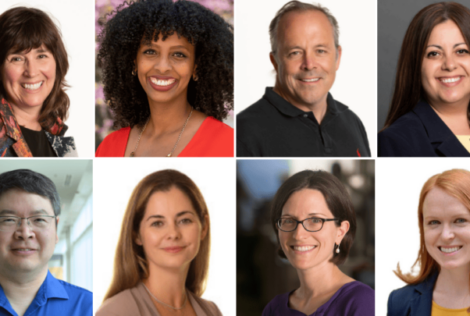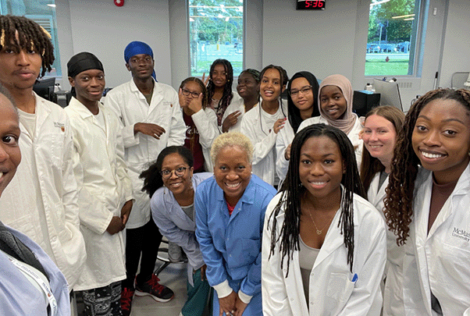
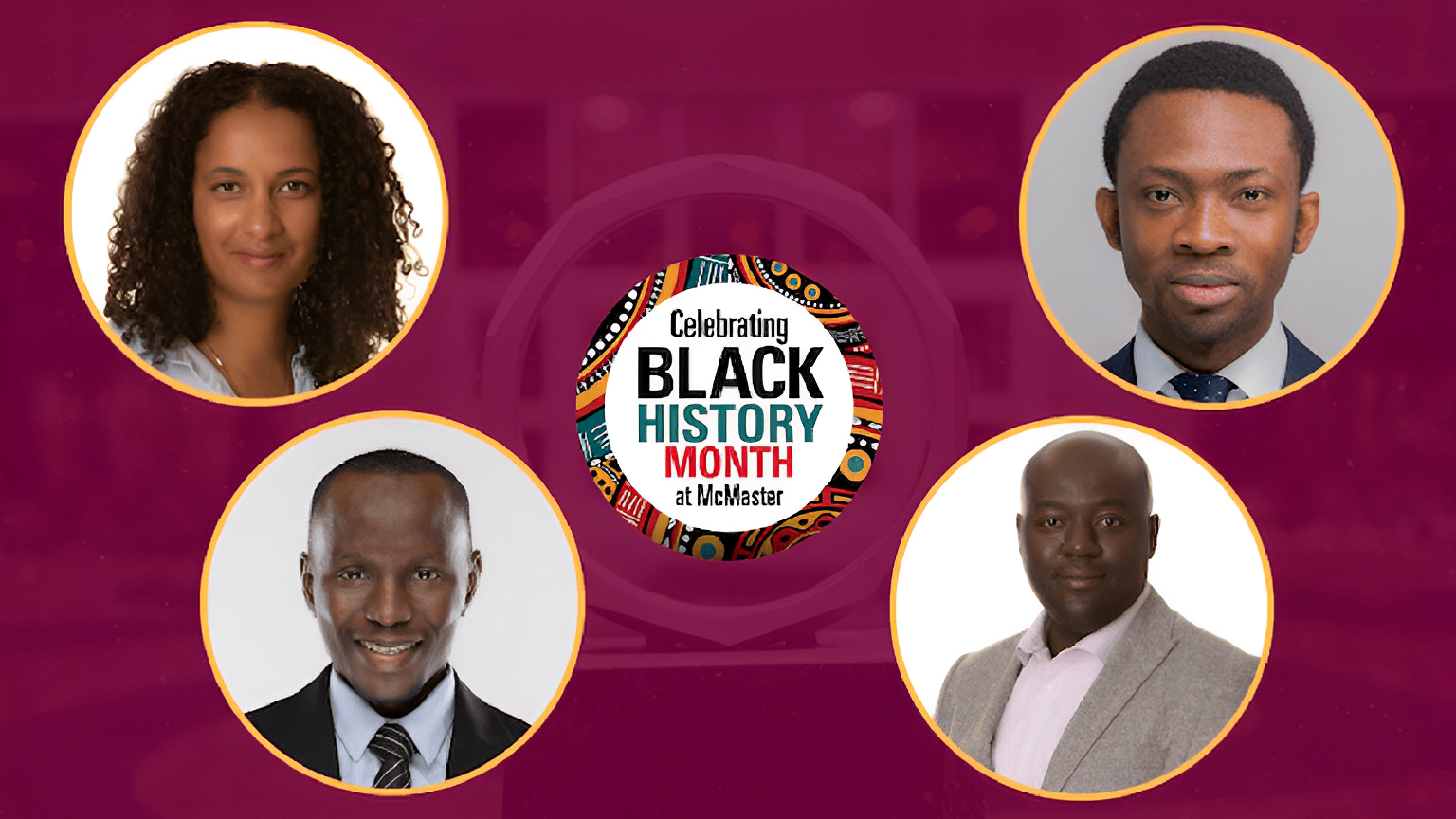
In honour of Black History Month, we are highlighting some of our new McMaster Engineering Black faculty members who discuss their research, the importance of Black History Month and their advice for future students.
Adedapo Awolayo
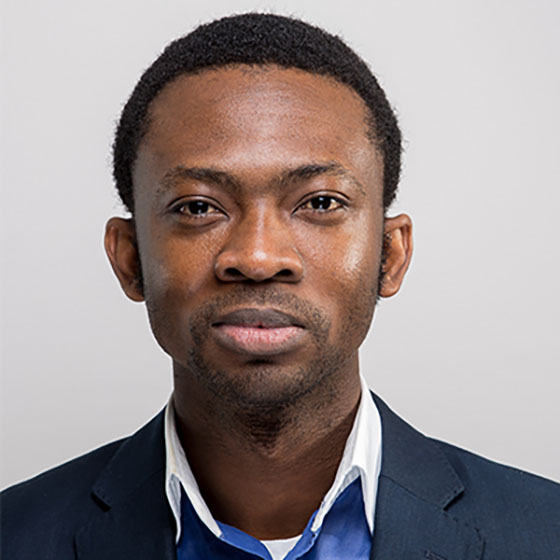
Civil engineering assistant professor Adedapo “Dapo” Awolayo’s mission is simple: save the Earth.
What is your area of research and its impact?
My research group at Mac is devoted to sustainable energy transitions and climate change mitigation strategies, such as geo-energy storage, which aims to remove carbon dioxide from the atmosphere and transform it into solid rocks, ensuring that today’s children and future generations can continue to inhabit the Earth in the face of the existential threat of climate change.
How would you describe the importance of Black History Month to others?
Black History Month is a time to celebrate and recognize the contributions, achievements, and experiences of Black people throughout history. It is indeed a moment to reflect on the strides made toward racial equality and to recognize the distance still to be travelled.
Promoting diversity and inclusivity, and recognizing the contributions and challenges faced by Black scientists and engineers are all reasons why this event is significant in the scientific and engineering community. Through this recognition and celebration, we can raise the visibility of underrepresented groups in STEM fields and encourage more students from diverse backgrounds to pursue STEM careers.
What is a historical moment in Black history that means the most to you and why?
The life and legacy of Nelson Mandela are an inspiring account of overcoming barriers through tenacity and perseverance in the face of adversity. Despite facing years of imprisonment and discrimination, Mandela believed strongly in the power of nonviolence and reconciliation, and he worked tirelessly to help mend the deep wounds left by apartheid and create a more just and inclusive society. His message of hope and reconciliation has become a touchstone for those fighting for justice and equality, and it continues to inspire millions of people around the world.
What advice would you share for Black engineering students, or future ones?
If I could go back in time and give myself some advice, it would be to tell the younger version of myself that engineering is a challenging and rewarding field, and that rather than letting fear or self-limitation hold you back, they should take advantage of all the opportunities it presents. Maintain your focus and perseverance on your path.
Create or join a group of peers, mentors, and colleagues who will cheer you on as you progress in your career.
Keena Trowell
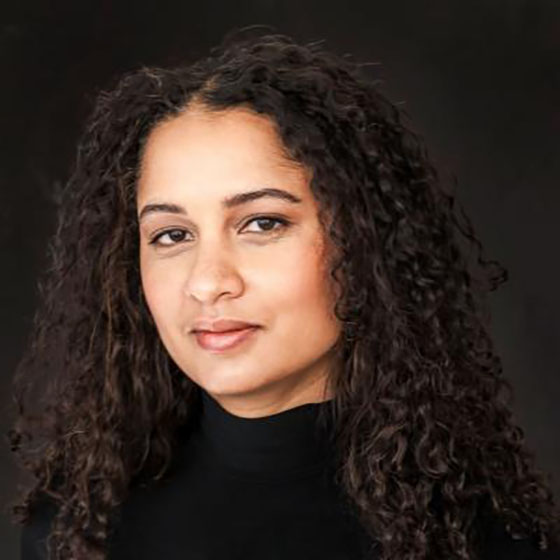
Mechanical engineering Assistant Professor Keena Trowell’s research is at the forefront of renewable energy sources.
What is your area of research and its impact?
I specialize in metal water reactions that creates hydrogen on demand. Certain metals, notably aluminium, magnesium, and zinc react with water to produce heat and hydrogen. The metal oxide that is created by the reaction can be recycled using renewable energy, which makes a sustainable closed–loop energy fuel cycle. The long–term goal of this research is to use metals as a mechanism for clean energy storage, and then use metal–water reactions to get that energy out thereby providing renewable energy wherever and whenever it is needed.
How would you describe the importance of Black History Month to others?
I think of Black History Month as the opportunity to tell the stories that have been erased, hidden, minimized, and dismissed. There is no history without Black history, and BHM is when we spotlight the role of Black people in shaping the world that we live in. BHM is for everyone to learn more about how the world they live in came to be.
Historical moment in Black history that means the most to you and why?
On March 6th, 1957 Ghana declared its independence from British colonial rule. It was the first sub-Saharan country to gain independence from European colonial rule. I was born in Ghana and I have always been proud of belonging to a nation that showed the world Black people could lead themselves.
How have you overcome barriers in your engineering career?
Honestly? Just by existing in this space. There aren’t many women engineering professors, and there aren’t that many Black engineering professors, and a vanishingly small number of Black women engineering professors.
Ousmane Hisseine
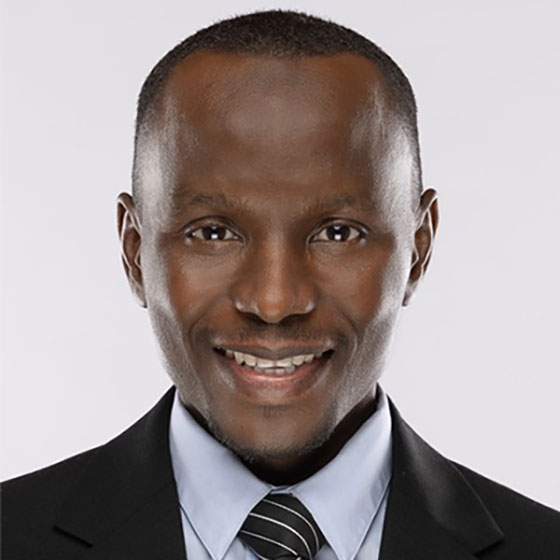
Hisseine joined McMaster Civil Engineering as a Tenure Track Assistant Professor in July 2022. Creating a more sustainable world is at the core of his research, which is focused on low-carbon cement and concrete composites for sustainable and resilient civil infrastructure.
What is your area of research and its impact?
To many people, it may be surprising that concrete is the second most widely consumed material on the planet. It is second only to water! Given the significant volume of production of concrete, more than one cubic meter per capita per year in Canada, the decarbonization of this sector is a principal lever of Canada’s net-zero future.
How have you overcome barriers in your engineering career?
I can say that there exist two types of barriers, those imposed by the society (external barriers or sometimes systemic) and those perceived by the person to be barriers (internal). For both types of barriers, one needs rigour, perseverance, self-confidence, long-term vision, and proactivity. It is often advantageous to focus on removing the internal barriers by building confidence on our capabilities. As a result, our possibility to develop to our full potential will be heightened. Since systemic barriers can often be driven by stereotypes, doing well in overcoming our own barriers (by achieving our best version) can contribute to overcoming some of systemic barriers.
What advice would you share for Black engineering students, or future ones?
Rigour, perseverance, self-confidence, long-term vision, and proactivity. I would place a special emphasis on the long-term vision, and proactivity advise Black students to further contribute to increasing their representation in higher education by advancing their studies.
The number of Black students complaining about the rarity of Black professors is far higher than the number of Black students willing to undertake graduate studies without which a professorial position is not possible. I would like also to invite Black students to take full advantage of the myriad of institutional support offered at McMaster University to support their success.
In fact, while in the wake of the incidences of June 2020, the whole world demonstrated an unprecedented level of support in solidarity with Black people, many of such supports were ephemeral in terms of impact on sustainability.
McMaster’s support in this context ended up being more enduring as translated into several initiatives such as the Black Student Success Center, the student mentoring program through the African-Caribbean Faculty Association of McMaster, Black Excellence Cohort Hire, and Black Student Postdoctoral Fellowship initiative.
Nana Ofori-Opoku
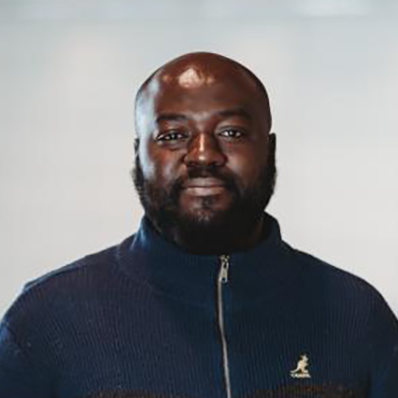
Three-time Mac Eng grad Nana Ofori-Opoku’s journey at McMaster began in 2002 as an undergraduate student in the Department of Materials Science & Engineering. More than 20 years later, he is now an Assistant Professor in the same department he got to know so well as a student.
What is your research area and its impact?
My research falls at the intersection of materials science and condensed matter physics. It combines thermodynamics, experiments, and high-performance computing to understand microstructure evolution in materials.
How would you describe the importance of Black History Month to others?
Beyond the celebration and recognition of the achievements of Blacks and Africans, it allows us to see the impact these people and events have made and how our lives and world have been made better. Additionally, particularly for those of the diaspora living abroad, it provides a sense of identity and unity, it is a source of inspiration and understanding of our capabilities.
How have you overcome barriers in your engineering career?
In order to overcome barriers, I’ve had to find community and mentors. Often those were difficult to come by. The biggest barriers have been systemic in my opinion and are linked to; (1) finishing an engineering degree and (2) how/if Black people are represented in the engineering profession and in the classroom. Both manifest themselves usually as imposter syndrome. Both make you question if you really do belong.
When I was doing my undergrad and graduate studies, I was one of two Black students in the entire undergraduate department and the only Black student in my graduate program.
In terms of community, I found one with other minorities with whom I shared some similarities. There is always a community to be found and at McMaster, I was ecstatic to see when I returned that there was an impetus with enough Black students to find their own chapter of the National Society of Black Engineers (NSBE), creating their own community.
I was also fortunate to have a PhD advisor who was extremely open, and supportive and allowed me to explore. In doing so I found a mentor from the industry, “someone like me”, with a similar upbringing who had achieved what I was trying to achieve, and I could use as a template for myself.
What advice would you share for Black engineering students, or future ones?
My advice for current Black engineering students is a simple one. I know what it takes, and it’s not an easy road, but that you’re here means you already have more than it takes. I will also urge and encourage current students to consider graduate school and academia as a profession. It’s hard to effect change from the outside and future Black students will need mentors.
For future engineering students, we’re here, which means you can be too. The path has been laid out. We. Are. Waiting. For. You.

